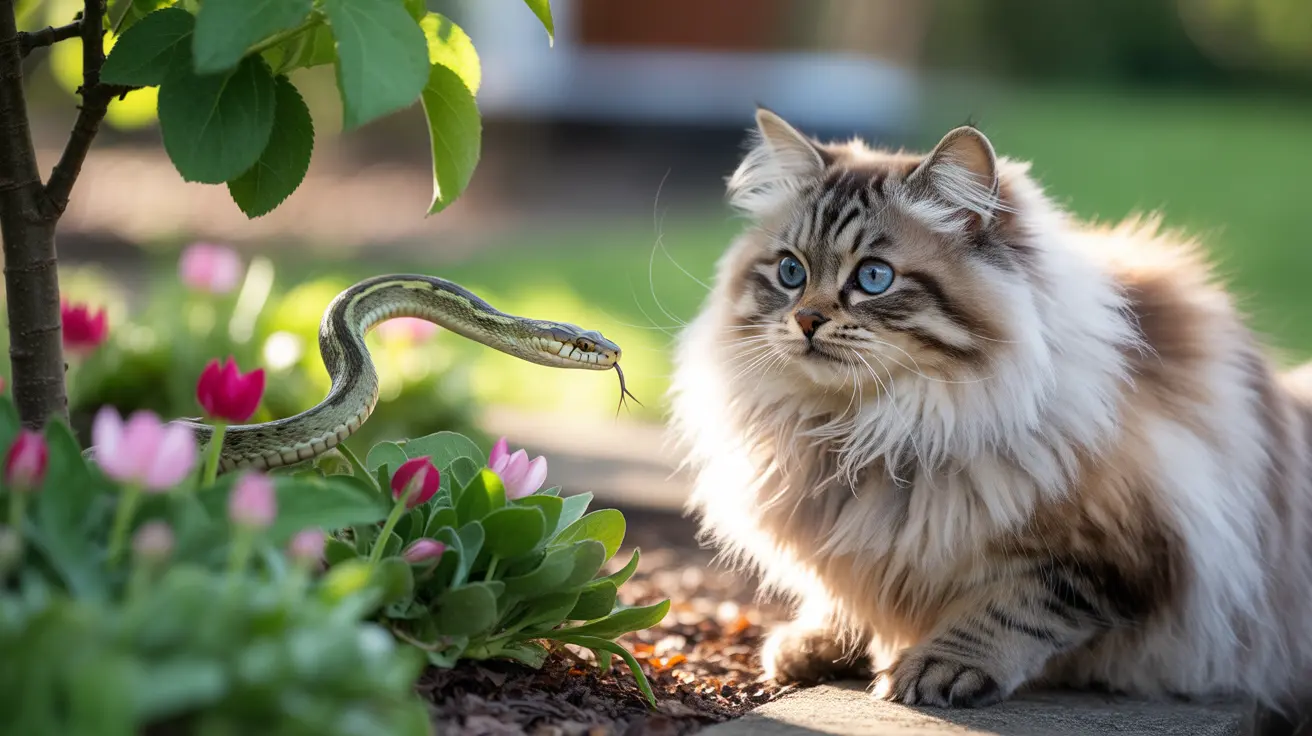Cats are renowned for their extraordinary sensory capabilities, and many pet owners wonder about their ability to detect potential threats like snakes. The answer is yes - cats can indeed smell snakes, thanks to their remarkably sophisticated olfactory system that far surpasses human capabilities.
With 45 to 200 million scent receptors compared to our mere 5 million, cats possess an incredible ability to detect various odors, including the distinct chemical signatures that snakes leave behind. This natural ability has evolved over thousands of years, helping cats survive and thrive in diverse environments.
How Cats Detect Snake Presence
Cats employ multiple sensory mechanisms to detect snakes in their environment:
Powerful Olfactory Abilities
A cat's nose can pick up specific chemical secretions from snake scent glands, which snakes release as a defensive mechanism. These secretions often trigger immediate responses in cats, ranging from increased alertness to active avoidance behaviors.
Advanced Hearing Capabilities
With their ability to hear frequencies between 48 Hz and 85 kHz, cats can detect subtle sounds of snake movement, including the distinctive rustle of scales against surfaces or the characteristic hissing sound that many snakes produce.
Vibration Detection
Cats' whiskers and sensitive paw pads can detect minute vibrations in the ground, potentially alerting them to a snake's presence even before visual confirmation.
Cat Reactions to Snake Encounters
When a cat detects a snake, their response can vary significantly based on several factors:
Typical Behavioral Responses
- Sudden freezing or alertness
- Backing away slowly
- Hissing or growling
- Puffed-up fur and arched back
- Intense staring or tracking movement
Individual Variations
Some cats may display hunting behavior, while others might show fear or caution. These responses often depend on the cat's personality, previous experiences, and whether they were raised in an environment where snake encounters were common.
Protecting Your Cat from Snake Encounters
While cats can detect snakes, it's essential to take precautions to ensure your pet's safety:
Preventive Measures
- Keep yards clear of debris where snakes might hide
- Maintain grass at a shorter length
- Install snake-proof fencing where possible
- Keep cats indoors during peak snake activity periods
- Create safe outdoor spaces like enclosed catios
Frequently Asked Questions
How can cats use their sense of smell to detect snakes nearby?
Cats use their highly developed olfactory system, with up to 200 million scent receptors, to detect chemical secretions from snake scent glands. They can pick up these scents from significant distances and often show immediate behavioral changes when they detect snake odors.
Do cats react differently to venomous snakes compared to non-venomous ones?
While cats can detect snake presence, they cannot specifically distinguish between venomous and non-venomous snakes through smell alone. Their reactions are based more on individual experience and instinct rather than the snake's venomous status.
What behaviors indicate a cat has sensed a snake's presence?
Common indicators include sudden alertness, freezing in place, dilated pupils, low growling, backing away, or intense focusing on a specific area. Some cats may also exhibit defensive postures or warning vocalizations.
Are cats at risk of being bitten by snakes, and how can owners protect them?
Yes, cats can be at risk of snake bites. Owners can protect their cats by keeping them indoors, maintaining snake-free yards, and seeking immediate veterinary care if a bite occurs.
Why do some cats try to hunt or bring snakes as gifts to their owners?
This behavior stems from cats' natural hunting instincts and their tendency to share prey with their family group. It's a complex behavior that combines predatory drive with social bonding, though it should be discouraged due to safety concerns.
Understanding your cat's ability to detect snakes can help you better interpret their behavior and take appropriate precautions to ensure their safety. While cats possess impressive snake-detection capabilities, responsible pet ownership includes creating a safe environment that minimizes the risk of dangerous encounters.






